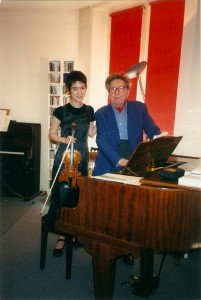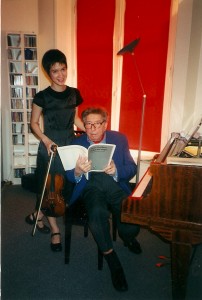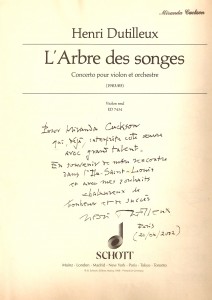Miranda Cuckson Remembers Henri Dutilleux
Thank you to Miranda Cuckson for this remembrance of composer Henri Dutilleux.
 My visit to Henri Dutilleux was part of one of the most beautiful summers I’ve had. I stayed for several weeks in Paris just before beginning my doctoral degree. I was determined to pass out of the language-course requirement, so I rented a little apartment on the Rue du Cardinal-Lemoine and immersed myself in French, reading twenty pages a day, chatting with storepeople and watching French talk shows on TV. Besides exploring the city and making day trips to Chartres and Auvers-sur-Oise, I visited many museums, including the small ones (Bourdelle, Zadkine), and heard music at the Salle Pleyel (Krystian Zimerman), Cité de la Musique (Ensemble Intercontemporain in Carter, Kurtag and Dalbavie), Théâtre du Chatelet (Bluebeard’s Castle) and Bastille Opera (Renée Fleming in Manon). Meanwhile I practiced every day, and sometime in the middle of my stay, I called up Henri Dutilleux.
My visit to Henri Dutilleux was part of one of the most beautiful summers I’ve had. I stayed for several weeks in Paris just before beginning my doctoral degree. I was determined to pass out of the language-course requirement, so I rented a little apartment on the Rue du Cardinal-Lemoine and immersed myself in French, reading twenty pages a day, chatting with storepeople and watching French talk shows on TV. Besides exploring the city and making day trips to Chartres and Auvers-sur-Oise, I visited many museums, including the small ones (Bourdelle, Zadkine), and heard music at the Salle Pleyel (Krystian Zimerman), Cité de la Musique (Ensemble Intercontemporain in Carter, Kurtag and Dalbavie), Théâtre du Chatelet (Bluebeard’s Castle) and Bastille Opera (Renée Fleming in Manon). Meanwhile I practiced every day, and sometime in the middle of my stay, I called up Henri Dutilleux.
I had been working on his violin concerto L’arbre des songes (The Tree of Dreams, which I fondly thought of as L’arbre des singes, The Tree of Monkeys) in my lessons at Juilliard with Robert Mann. I was becoming increasingly interested in contemporary music and working with composers, and Mr. Mann’s involvement in that kind of thing was very inspiring to me. Mr. Mann and the Juilliard Quartet had commissioned Dutilleux in 1976 to write the string quartet Ainsi la nuit. Having listened to me play the concerto, he contacted Dutilleux and asked him to hear me. I was of course thrilled that the composer agreed. When I called Monsieur Dutilleux, he asked if I had a pianist to play with. I said no, so he arranged for a young Japanese woman from the Paris Conservatoire to come and play the orchestra part.
One morning, I walked along a traffic-less, narrow street on the Île Saint-Louis, where pinkish-grey buildings glowed softly in the sun. The air was warm and stirred only by the sound of children’s playful shrieks, emanating from somewhere. Dutilleux greeted me at his studio – a rather small-framed man wearing a jacket with his trousers pulled high on his waist. He was entirely elegant and welcoming. His cozy studio was neat, with piles of scores and manuscript paper, and sunny. The children’s voices were louder now through his open window- closing them, he said that there was a school in the back and he enjoyed hearing their shouts. We talked a while, then I played his piece through. He made only a few comments – details of articulation, phrasing – then he signed my music and we talked a while more. We had tea and he gave me a copy of his CD, The Shadows of Time with the Boston Symphony, and talked about his use of children’s voices in the music. Then I went on my way.

 I recently saw Dutilleux’s short posthumous homage to Elliott Carter, in which he said that they did not meet much and that he had few specific memories besides of “a nice and strong character, a very charming man, and though we were far from each other – the Atlantic Ocean between us – I remain close to him and his music.” That June day was my only meeting with Dutilleux, but it was very meaningful for me to meet the creator of this music, and to play his substantial work under his curious and attentive gaze. He reminded me of certain great artists I’ve known, who share a simplicity and contentedness in their way of living that comes, I feel, from their satisfaction in their work and their love for what they do. Listening to recordings, I again relish his music’s generous ardor and stimulating clarity, luscious warmth, sweeping ebb and flow, big-band homophonic blocks of harmonies, and sense of spaciousness between the deep low register and the radiant highs. I respect his fastidiousness in composing but I dearly wish he had been more prolific in writing chamber and solo works that we could play and program. Having few pieces of his to play, I feel about his music much as I do about my meeting with him – truly delighted and wanting more chances to engage directly. He definitely left us wishing for more.
I recently saw Dutilleux’s short posthumous homage to Elliott Carter, in which he said that they did not meet much and that he had few specific memories besides of “a nice and strong character, a very charming man, and though we were far from each other – the Atlantic Ocean between us – I remain close to him and his music.” That June day was my only meeting with Dutilleux, but it was very meaningful for me to meet the creator of this music, and to play his substantial work under his curious and attentive gaze. He reminded me of certain great artists I’ve known, who share a simplicity and contentedness in their way of living that comes, I feel, from their satisfaction in their work and their love for what they do. Listening to recordings, I again relish his music’s generous ardor and stimulating clarity, luscious warmth, sweeping ebb and flow, big-band homophonic blocks of harmonies, and sense of spaciousness between the deep low register and the radiant highs. I respect his fastidiousness in composing but I dearly wish he had been more prolific in writing chamber and solo works that we could play and program. Having few pieces of his to play, I feel about his music much as I do about my meeting with him – truly delighted and wanting more chances to engage directly. He definitely left us wishing for more.